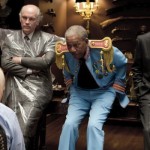Mother and Child Review
Those of you who found Crash—or Clint Eastwood’s clunker Hereafter—unwatchable should stay far, far away from Rodrigo Garcia’s Mother and Child. It’s the kind of film that starts in several very different places and seeks to weave all of its threads together. But while I thought Paul Haggis’ film was engaging (if a little heavy-handed), Garcia’s film’s reach exceeds its grasp. It tries to do too much and it uses sentimentality to cover its missteps. It’s not a total failure—there are a number of good performances, and the film’s final half-hour is touching—but on the whole, Mother and Child is bit of a disappointment.
The film, somewhat ironically, introduces us to three women, who at the start of the film, are far from being mothers. Karen (Annette Bening) is a very bitter middle-aged woman who gave up a child for adoption when she was 14. She never quite forgave herself for it, and she takes her pain out on any child she encounters. Elizabeth (Naomi Watts) was given up for adoption as a child (three guesses as to who her biological mother is). As a result, she has lived an incredibly guarded, independent life. But when her boss (Samuel L. Jackson) gets her pregnant, she’s forced to abandon that attitude, for she’ll never do to a child what her mother did to her. Finally, there’s Lucy (Kerry Washington), a happily married, but infertile woman who wants nothing more than a little girl to call her own. She and her husband decide to adopt, but they’re in for a rude awakening as the process is an emotionally grueling experience.
Of the three storylines, Lucy’s is the most consistent. Her journey is draining, and its climax is incredibly emotional. Karen’s story works to a certain degree, as well. In the beginning, she’s insufferable as a kindly coworker (Jimmy Smits) tries to befriend her. He gets her to open up, however, and at that point, we’ve start to grow attached to her. It’s a great character transformation sold wonderfully by Annette Bening. She’s deservedly getting Oscar attention for her amazing work in The Kids Are All Right, and while her work here doesn’t quite measure up, it’s still quite good.
The story that doesn’t really work is Elizabeth’s. Like Karen, she’s not an easy character to connect with at first—she, however, isn’t just rude, but actively cruel. And Garcia tries to sell a similar transformation, but it’s a case of too little, too late. Elizabeth’s final moments in the film are poignant, but are a few good minutes enough to make up for nearly two hours of not caring one iota for this individual? I didn’t think so.
When it comes to the way Garcia connects the storylines, I think he could have done worse. Sure, fate intervenes at precisely the right time to make the connections, but if you can suspend disbelief just a little bit, I don’t think many people will have a problem accepting them. As far as the script goes, however, I did take issue with how false some of the lines sounded for me. A few times, I found myself saying, “No one speaks this way.â€
In the beginning of the year, I predicted Mother and Child would do well. I thought the good buzz out of Toronto in 2009 could carry the film to a Best Picture nod, as well as recognition for the long overdue duo of Annette Bening and Samuel L. Jackson (who’s forgettable). The film came and went, however, and I guess it’s not hard to see why. Stories like this have been told plenty of times before—usually better than this. It’s not a bad film, but there’s just not much to get excited about.

















